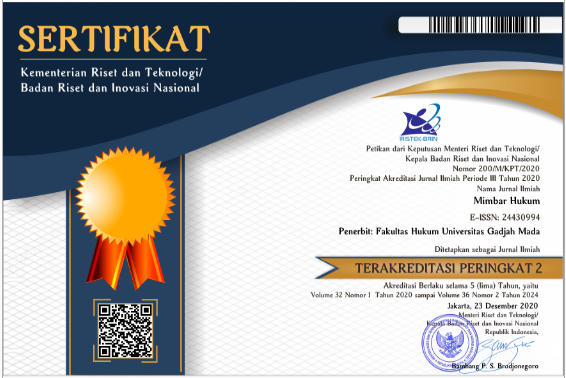How Adat Law Breaks The Cycle Of Vengeance: The Epkeret Tradition in Southern Buru
Ari Siswanto(1*), Leo Christy Menoha Teslatu(2)
(1) Satya Wacana Christian University
(2) Satya Wacana Christian University
(*) Corresponding Author
Abstract
Abstract
This study was conducted on epkeret practice as an adat institution to resolve the conflict in South Buru.
Specifically, the examined problems are how epkeret contributes to resolving inter-family conflicts and how the parties perceive epkeret. This study aims to identify the potential of epkeret as a customary dispute resolution. The research, which was mainly conducted using interview method, reveals that epkeret played an important role in preventing the cycle of violence in society. Another result obtained is that parties associated with epkeret have a positive perception of this adat institution.
Intisari
Penelitian ini dilakukan terhadap praktik epkeret sebagi pranata adat untuk menyelesaikan konflik di
Buru Selatan. Secara lebih spesifik masalah yang diteliti adalah bagaimana kontribusi epkeret dalam
menyelesaikan konflik antar-keluarga dan bagaimana pihak-pihak yang terkait mempersepsikan epkeret. Penelitian ini bertujuan mengidentifikasi potensi epkeret sebagai salah satu cara penyelesaian sengketa secara adat. Penelitian yang terutama dilakukan melalui metode wawancara ini mengungkapkan bahwa epkeret memainkan peran penting untuk mencegah siklus kekerasan di dalam masyarakat. Hasil lain yang diperoleh adalah bahwa pihak-pihak yang terkait dengan epkeret memiliki persepsi positif terhadap pranata adat ini.
Keywords
Full Text:
PDFReferences
Cotterrell, Roger, 2006, Law, Culture and Society - Legal Ideas in the Mirror of Social Theory, Ashgate Publishing, Burlington. Holleman, J.F., 1981, Van Vollenhoven on Indonesian Adat Law, Martinus Nijhoff, Leiden. Leeuw, Frans L. & Schmeets, Hans, 2016, Empirical Legal Research A Guidance Book for Lawyers, Legislators and Regulators, Edward Elgar Publishing, Cheltenham. Marzuki, Peter Mahmud, 2011, An Introduction to Indonesian Law, Setara Press, Malang. Putnam, Robert D., 2000, Bowling Alone, Simon & Schuster, New York. Faqir, Raed S.A., The Philosophy of Punishment: A Study to the History of Classical and Positive Schools of Penology, Forensic Research & Criminology International Journal, Vol. 1 Issue 6, 2015. McBain, Graham, Modernising the Law of Murder and Manslaughter, Journal of Politics and Law; Vol. 8, No. 4, 2015. Mengesha, Abebe Demewoz et al., “Indigenous Conflict Resolution Mechanisms among the Kembata Society”, American Journal of Educational Research, Vol. 3, No. 2. 2015 Patinama, “If Jesus was Born in Bipolo”, article in Pikom GPM ASSAU Journal, 2005, ISSN.: 1412-788. Boege, Volker, “Traditional Approaches to Conflict Transformation — Potentials and Limits”, paper, Berghof Research Center for Constructive Conflict Management, Berlin. Buana, Mirza Satria, “Living adat Law, Indigenous Peoples and the State Law: A Complex Map of Legal Pluralism in Indonesia”, s.l., s.d.
Article Metrics
Refbacks
- There are currently no refbacks.
Copyright (c) 2018 Ari Siswanto, Leo Christy Menoha Teslatu

This work is licensed under a Creative Commons Attribution 4.0 International License.



























